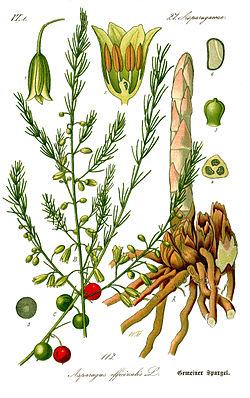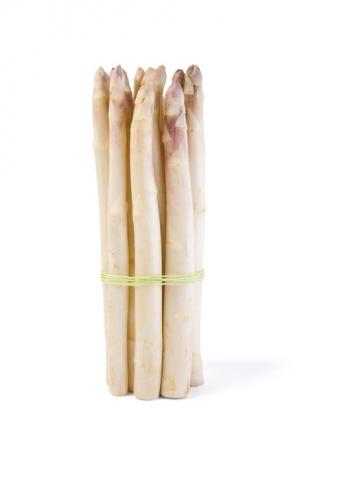Asparagus has been used as a vegetable and medicine, owing to its delicate flavour, diuretic properties, and more. It is pictured as an offering on an Egyptian frieze dating to 3000 BC. In Ancient times, Greeks ate it fresh when in season and dried the vegetable for use in winter. A recipe for cooking asparagus is in the oldest surviving book of recipes, Apicius’s third-century AD De re coquinaria, Book III.
The ancient Greek physician Galen (prominent among the Romans) mentioned asparagus as a beneficial herb during the second century AD, but after the Roman empire ended, asparagus drew little medieval attention until al-Nafzawi's The Perfumed Garden. That piece of writing celebrates its (scientifically unconfirmed) aphrodisiacal power. The finest texture and the strongest and yet most delicate taste is in the tipS. The points d'amour ("love tips") were served as a delicacy to Madame de Pompadour.
The second century physician Galen described asparagus as "cleansing and healing.” Water makes up 93% of Asparagus`s composition. Asparagus is low in calories and is very low in sodium. A good source of vitamin B6, calcium, magnesium and zinc, and a very good source of dietary fibre, protein, vitamin A, vitamin C, vitamin E, vitamin K, thiamin, riboflavin, rutin, niacin, folic acid, iron, phosphorus, potassium, copper, manganese and selenium, as well as chromium, (a trace mineral that enhances the ability of insulin to transport glucose from the bloodstream into cells), studies have shown asparagus is a low-calorie source of folate and potassium: Its stalks are high in antioxidants. Asparagus provides essential nutrients: six spears contain some 135 micrograms (μg) of folate, almost half the adult RDI (recommended daily intake), 20 milligrams of potassium"The amino acid asparagine gets its name from asparagus, as the asparagus plant is relatively rich in this compound. Additionally, research suggests folate is key in taming homocysteine, a substance implicated in heart disease. Folate is also critical for pregnant women, protecting against neural tube defects in babies. Studies have shown that people who have died from Alzheimer's Disease have extremely low to no levels of folate.

